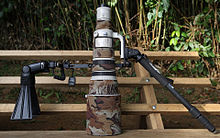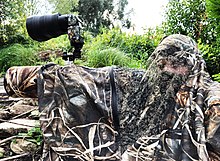Wildlife is among the most challenging motifs for a photographer, and needs a combination of good luck, patience, experience and good equipment.
Understand
[edit]| Travel photography Film • Full systems • Video recording • Wildlife photography • Drones |

Countless documentaries, websites, and books include pictures of wildlife. This makes their information come alive, and the pictures give people a better idea of what wildlife in foreign places looks like. Without wildlife photography, people wouldn't have nearly as good an idea of what animals look like in faraway places, from African elephants to plants that are only native to a small region or island. Wildlife photography is often taken for granted, but like photography in general, a picture is worth a thousand words.
Prepare
[edit]Wildlife photography often requires a long telephoto lens, though things like a flock of birds or a tiny creature need other lenses. Video recording can be useful to capture animal behavior.
Challenges
[edit]
Many exotic animals are hard to find; you might need to wait a considerable time for them to appear, or you might have to search for them. Wild animals might either be shy or aggressive. The environment might be cold, hot, or otherwise hostile.
Many animals and birds are easily spooked. You may need to use camouflage or build a blind to hide in. You may also need to limit actions that might give away your presence — moving about, talking to your companions, smoking, ...
Some parks have rules about taking photographs for commercial purposes.

